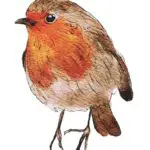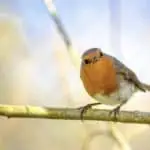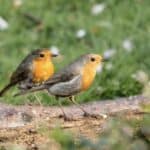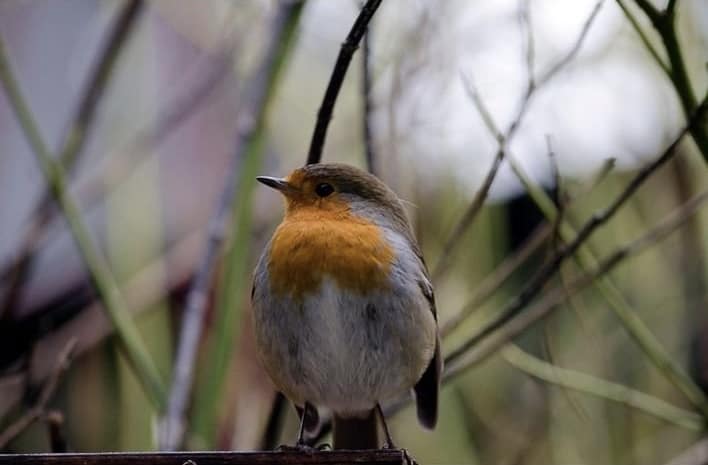Robins are one of the most common birds in Europe, and they’re known for their cheerful song. But where do these birds go at night? Do they sleep in trees like other birds, or do they find other places to roost?
What Do Researchers Think About the Different Nighttime Habits of Robins?
There are two main schools of thought when it comes to where robins spend their nights. Some researchers believe that these birds roost in trees, while others think that they find other places to sleep, such as bushes or on the ground. There is evidence to support both theories.
For example, one study found that robins tended to roost in trees that were close to each other. This suggests that these birds might prefer to sleep in groups, which would be more likely to happen if they roosted in trees. However, another study found that they didn’t seem to have a preference for roosting in trees or other places. So the jury is still out on where exactly these birds spend their nights!
What is known for sure is that robins are active at night. They have been observed flying around and perching on branches in the dark. So whether they’re roosting in trees or somewhere else, it’s clear that these birds are busy even at night time.
How Can You Tell if a Robin is Active at Night
If you want to know if a robin is active at night, there are a few things you can look for. First, listen to their distinctive song. These birds are known for singing at dawn and dusk, so if you hear a bird singing in the middle of the night, it’s likely to be a robin. You can also look for these birds in your garden or local park at night. They’re usually quite active, so you may be able to spot one flying around or perching on a branch.
How Long Do They Sleep
Robins are generally active during the day, but they do rest at night. However, they don’t appear to sleep for long periods like other birds. Instead, they seem to take short naps throughout the night.
This behaviour is known as “catnapping,” and it’s thought to help the birds stay alert and safe from predators. If you see a robin perched in a tree at night, likely, the bird is just taking a quick nap!
How Do They Sleep at Night
When European robins roost in trees, they often perch on a branch with their feet tucked underneath them. This position helps the birds stay warm and protected from the elements.
Robins are interesting birds, and there’s still much to learn about them. For example, more research is needed to understand why some robins roost in groups. Additionally, it’s not clear how long these birds can go without sleep. However, we do know that they are fascinating creatures with unique nighttime habits.
What Can We Learn From their Different Nighttime Habits
First, we can learn that these birds are adaptable creatures. They’re able to adjust their sleeping habits based on the availability of food and shelter.
Second, we can learn that robins are amazing creatures with unique nighttime habits. Even though they’re small birds, they have a lot of personalities and quirks.
Lastly, we can learn that they are an important part of the ecosystem. They play a vital role in pollinating plants and controlling insect populations. Without them, our world would be a very different place!
10 Tips to Protect Robins During the Night
- Keep your garden clean, tidy, and bird-friendly
- Provide nesting materials – if you provide nesting materials, such as straw or leaves, robins will be more likely to build their nests in your garden.
- Install a night light – a night light will help to keep robins safe from predators as they fly around at night.
- Put up birdhouses – birdhouses can provide robins with a safe place to roost at night, away from predators.
- Be careful with pesticides – pesticides can be harmful to European robins, so only use them when necessary. If you do use them, make sure to follow the manufacturer’s instructions carefully.
- Plant native plants – native plants are more likely to provide food and shelter for robins. By planting them in your garden, you can help to create a habitat that is ideal for these birds.
- Avoid using herbicides – herbicides can kill the insects that robins eat. If you must use them, only use them in areas that are away from where the birds are likely to feed.
- Keep cats indoors – cats are one of the biggest predators of robins. By keeping your cats indoors, you can help to protect these birds.
- Educate your neighbours – if you educate your neighbours about the importance of protecting robins and other birds, they will be more likely to take steps to protect them as well.
- Report any sightings of dead or injured robins – If you see a dead or injured robin, please report it to your local authorities. By doing so, you can help to ensure that these birds are protected.
Key Takeaways
Most robins roost in trees during the night. They often sleep in the same tree every night, and they usually roost alone or in pairs. However, there have been reports of large groups of robins roosting together in some areas. It’s not clear why this happens, but it could be related to the availability of food or shelter.
While most robins roost in trees, some have been known to sleep in other places. For example, some robins have been seen roosting in bushes, on the ground, or even in human-made structures like buildings. It’s believed that these birds choose to roost in these places when there are no suitable trees available.
So, if you’re ever out and about at night, keep your eyes peeled for robins roosting in unusual places! You might just be able to spot one of these beautiful birds.
You May Also Like…
- 4 Possible Reasons Why Robins Sing At Night

- Why Robins Have Red Chests

- Where Do Robins Go As Night Falls

- Where Do European Robins Go In Winter

- Where Do European Robins Go In Summer

- The Difference Between European Robin & American Robin

- Do European Robins Migrate

- Do Male & Female European Robins Sing

- Where Do European Robins Live

- Where Do Robins Sleep At Night In Winter

- Where Do Baby Robins Go When They Leave The Nest

- What Does A Robin Like To Eat


